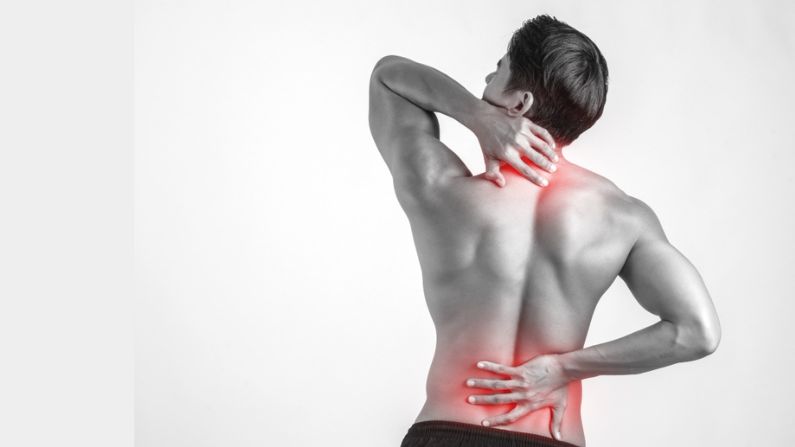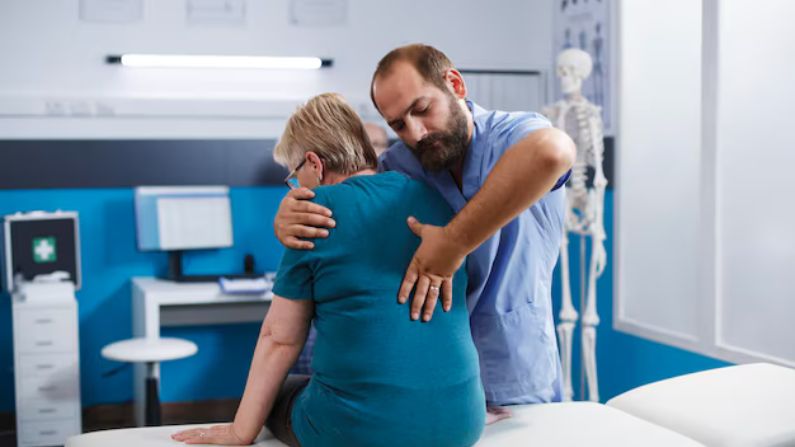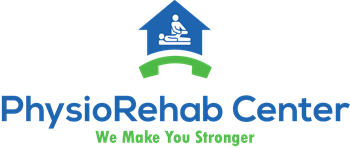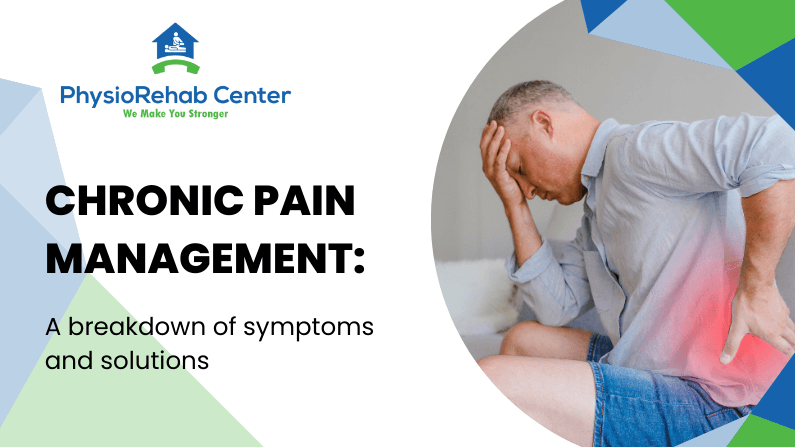Chronic pain is a complex and often weakening condition which impacts many people across the globe. At Physio Rehab Centre, we recognize the impact that chronic pain management can have on one’s day-to-day living. So, we have invested in management strategies to help individuals regain their lost quality of life.
In this blog, we shall analyze the various symptoms of chronic pain, consider the causative factors and assess the available treatment methods for particular conditions that seek to enhance the management of chronic pain.
Understanding Chronic Pain
- Definition of Chronic Pain: Chronic pain is defined as lasting more than three months, most often extending even after the healing of the affected part or the ailment itself. It can be moderate or severe, continuous or episodic, and draining to normal life and well-being.
- Prevalence: From statistics, it can be observed that approximately 20% of Canadians suffer from chronic pain which equates to millions of people living with recurrent pain. This level of prevalence points to the need for solutions that address chronic pain effectively so that affected one’s quality of life is improved.
Signs and Symptoms of Chronic Pain

- Persistent Pain: One of the primary signs of chronic pain in the body is the continuance of feeling pain in certain body parts such as the back, joints, or even muscles. One can feel this pain in different forms: dull, sharp, throbbing, or at times even burning, making it difficult for many people to explain the kind of suffering they go through.
- Sensitivity to Touch: People living with chronic pain as well as predisposing factors suffering from the pain show increased sensitivity often allodynia meaning that even skin of normal contact becomes painful. This makes it hard for patients to perform simple tasks such as putting on clothes or touching things without pain.
- Fatigue: Aside from being physically exhausting, chronic discomfort can also result in mental weariness. Because of the unending pain one might undergo, energy levels can be depleted leading to the unwillingness to carry out daily chores and activities, further contributing to feelings of helplessness.
- Sleep Disturbances: Individuals with chronic pain for the most part tend to have trouble initiating sleep or maintaining sleep. Pain can interrupt sleep patterns, leading to insomnia or restless nights. The inability to get restorative sleep can further lead to tiredness and anger, making it a cycle.
- Mood Changes: Emotions and psychological functions are impacted from prolonged and persistent pain resulting in mood changes, anxiety, depression and irritability. Individuals may find themselves feeling overwhelmed or hopeless as they struggle to manage their pain and its impact on their lives.
- Limited Mobility: Chronic pains tend to limit one’s mobility with a suggestion of low ranges of motion and complication in simple tasks like bending, carrying or even walking. This limitation can further contribute to feelings of frustration and helplessness.
Causes of Chronic Pain
- Injury or Surgery: It is very common for chronic pain to arise after trauma or after surgical intervention. Even in cases where the injury in question appears to have healed, pain can remain as a result of the nervous system changes or the way the injury has healed.
- Medical Conditions: Chronic pain may be caused by a number of health disorders such as those like arthritis, fibromyalgia, multiple sclerosis, and spine disorders. Understanding the underlying condition is crucial for effective management.
- Nerve Damage: Nerve-related pain, known as neuropathic pain, can arise from conditions such as diabetes, shingles, or spinal cord injuries. Such pain is often not like any muscle or Joint pain, instead feels like burning or tingling.
- Psychological Factors: Stressful situations such as anxiety and depression also add to the levels of perceived pain. Psychological factors can create a feedback loop where pain leads to emotional distress, which in turn heightens the perception of pain, making it challenging to break free from the cycle.
Chronic Pain Management Strategies

Physiotherapy:
- Role of Physiotherapy: Physiotherapy is an essential component of the treatment and rehabilitation of patients suffering from chronic pain. A physiotherapist examines the patient’s condition and makes a rehabilitation program concerning the pain relief, rehabilitation, and overall functioning of the patient.
- Techniques Used: Physiotherapists utilize a variety of techniques, including manual therapy, therapeutic exercises, and modalities like ultrasound or electrical stimulation, to alleviate pain and enhance mobility. They focus on improving strength, flexibility, and posture, which can contribute to pain reduction.
Exercise
- Importance of Physical Activity: Regular exercise is crucial for managing chronic pain. Physical activity improves flexibility, enhances strength and endurance, and therefore, over time, may decrease pain levels. Secondly, exercise stimulates production of chemicals known as endorphins, which are natural pain relievers produced by the body.
Pain Management Techniques
- Cognitive Behavioral Therapy (CBT): CBT is a form of psychotherapy that helps patients manage pain by changing negative thought patterns and improving coping strategies. It empowers individuals to take control of their pain rather than feeling victimized by it. CBT focuses on teaching patients how to reframe their thoughts about pain and develop healthier coping mechanisms.
- Mindfulness and Relaxation: Mindfulness meditation, focusing attention on breathing, and doing progressive muscle relaxation are some stress reduction techniques that improve chronic pain management considerably. These elements help in calming the patient, enabling them to control their emotions towards pain.
Alternative Therapies
- Acupuncture: This traditional Chinese medicine technique involves inserting thin needles into specific points on the body. Acupuncture is regarded by many people in society as a way of easing pain and improving general health. Studies suggest that acupuncture may stimulate the release of endorphins and promote blood flow, contributing to pain relief.
- Massage Therapy: Therapeutic massage is used to decrease muscular tension as well as increase blood flow. The positive effects of massage therapy include relief from pain as well as relaxation and decreased mental tension. It can be particularly beneficial for individuals with muscle-related pain or tension.
Lifestyle modifications
- Healthy Diet: A well-balanced diet that includes sufficient amounts of anti-inflammatory agents such as fruits, vegetables, whole-grain products, and omega-3 fatty acids can help in chronic pain management. Examples of such food include fatty fish, nuts, and leafy vegetables which have the capability of fighting off inflammation among other health benefits.
- Hydration: To maintain good health, a person should ensure that the body is adequately hydrated, that is, appropriate bodily fluids for a given activity are taken. In addition, dehydration is known to increase the feeling of pain and can cause muscle cramps and therefore it is important to drink sufficient water. Also, maintaining optimal levels of hydration reduces the recovery period and improves the physical capabilities of a person.
- Sleep Hygiene: It has been established that maintaining a sleep regimen, practicing good sleep hygiene and more importantly ensuring that the bed environment is conducive for sleep may lead to better sleep quality which is very important in controlling pain. Avoiding watching television or mobile during bedtime, maintaining a consistent sleep schedule and creating a comfortable sleeping environment are some of the good examples of sleep hygiene practices.
Support systems
- Seeking Support: Impacts of chronic pain on individuals enable them to look for support groups or family therapy. It is always comforting to know that there are people who understand what you are going through by sharing similar problems. Support networks can play a crucial role in emotional healing.
- Education and Awareness: Learning about chronic pain management enables an individual to manage their condition better. For instance, information helps to correct false beliefs about the condition, explains various ways of treatment available and helps the individual to become more active in self-care.
The Role of Physio Rehab Centre

Care of patients who suffer chronic pain is at the core of each and every offering at Physio Rehab Centre. Our experienced physiotherapists use the best rehab programs in order to help you take control of your life again.
How We Can Help
Initial assessment
You will undergo a detailed evaluation to identify the specific conditions you are suffering from, the origin of these conditions and the way they affect your life. This initial assessment is crucial for developing a tailored treatment plan that addresses your unique needs.
Tailored treatment plans
In relation to your assessment, we create an individualized treatment approach with a combination of physiotherapy, exercises, pain relief and other therapies aimed at controlling your pain.
Ongoing support
The enhancement of your care program and its constant upholding at an effective level is what our specialists do on a regular basis. After every treatment stage completion, we take certain measures to follow up on your healthy condition and modify treatment procedures, if needed.
Education
We provide information and learning materials to explain more about your illness, its causes and ways to deal with those. Empowering you with knowledge is a key part of our approach, enabling you to make informed decisions about your care.
Community Engagement
We invite community involvement in different activities such as workshops, seminars, and support groups. These initiatives foster a sense of belonging and provide valuable resources for individuals managing chronic pain.
Chronic pain can be a daunting challenge, however, knowing its symptoms and how to manage them further can enhance a person’s quality of life. At Physio Rehab Centre, we are committed to providing the care and support you need to navigate this complex condition. Our rehabilitation programs are designed to help you overcome the pain so that you can go ahead and live your life.


Recent Comments